
Guests
- Toni Ruckerhas been helping her daughter Mareshia Rucker and other students who have organized the first integrated prom at Wilcox County High School in Georgia, which will be held tomorrow.
- Brandon Davishelped organized Wilcox County High School’s first-ever integrated prom.
- Mareshia Ruckerhelped organized Wilcox County High School’s first-ever integrated prom.
A group of Georgia high school students are making history by challenging the segregation of their high school prom. Thanks to their efforts and the support of groups like the NAACP, Wilcox County High will hold its first-ever integrated prom this Saturday, nearly 60 years after Brown v. Board of Education desegregated the nation’s school system. In the past, the proms have been organized by private groups, and parents behind the “white prom” have refused to let African-American students attend. Local officials say the segregated prom has continued because it is organized privately, out of the school district’s control. News of the case spread quickly over social media, fueling support and donations for an integrated prom from as far away as Australia and South Korea. We speak with two of the students who are helping to organize the integrated prom: Mareshia Rucker and Brandon Davis. We also speak to Mareshia’s mother, Toni Rucker, who encouraged her daughter’s efforts. In addition, we air an excerpt from a recent interview with Carlotta Walls LaNier, who was 14 years old when she became one of the “Little Rock Nine” who integrated Little Rock Central High School in Arkansas in 1957.
Transcript
AMY GOODMAN: “Always and Forever,” Pat Metheny, here on Democracy Now!, democracynow.org, The War and Peace Report. I’m Amy Goodman, with Juan González.
JUAN GONZÁLEZ: We turn now to Georgia, where a group of high school students are making history by challenging the segregation of their high school prom. Thanks to their efforts, Wilcox County High will hold its first-ever integrated prom this Saturday, nearly 60 years after Brown v. The Board of Education desegregated the nation’s school system.
The students received support from the NAACP and other groups. At a press conference, the president of the NAACP’s Georgia chapter, Edward DuBose, laid blame for segregated proms at the feet of parents and school administrators.
EDWARD DUBOSE: Shame on you. Shame on any parents who continue to embrace the politics of segregation. When you are the leaders of the county and you allow your community to retreat to the era of segregation, you are the problem.
AMY GOODMAN: Saturday’s prom will be the first in Wilcox County High’s history to bring together students of all backgrounds. In the past, the proms have been organized by private groups, and parents behind the “white prom” have refused to let African-American students attend. Local officials say the segregated prom has continued because it’s organized privately, out of the school district’s control. News of the case spread quickly over social media, fueling support and donations for an integrated prom from as far away as Australia and South Korea.
Well, for more, we’re joined by two of the students who are helping organize Saturday night’s integrated prom: Mareshia Rucker and Brandon Davis. And then we’ll speak with Mareshia’s mother, Toni, who has encouraged her daughter’s efforts.
Mareshia, tell us how it’s possible that the prom has been segregated for all of these years and what you decided to do about it.
MARESHIA RUCKER: That’s actually a good question. Our school, when they integrated, they never did start to sponsor a school prom, so they left it up to the parents to have a prom for their children. That’s how it ended up having a white prom and a black prom all these years. But when we became juniors, toward the beginning—the end of our junior year and the beginning of our senior year, we decided that we get along with everyone, we all do everything together, so there was no reason for us to have a prom that excluded any one of us.
JUAN GONZÁLEZ: And, Brandon, what’s been the reactions, first of your fellow students and then also of parents of the students, to this idea?
BRANDON DAVIS: Well, at first we had a whole bunch of students who—you could tell they wanted to support it, but they were too scared to stand out and stand against not just their peers but their parents. But as time’s progressed and time’s gone on, we’ve had more and more students change, come help us out, and we’ve actually had more parents. At first, it was like—parents were like, “Well, it’s tradition. Let’s just stay it this way.” But after time, their children changed. They’re like, “Hey, I’m going to support my children. This is their memory. Let’s go.”
AMY GOODMAN: Brandon, did you ever go to the white prom?
BRANDON DAVIS: No, Ma’am.
AMY GOODMAN: And how is it that the white parents would not allow in black students?
BRANDON DAVIS: Well, since it’s a private event, they have all the power they want, and they can say, “Hey, none of the black kids can come, because it’s just private.” And that’s just protected them against all these laws.
AMY GOODMAN: So, Mareshia, the homecoming queen this year, the prom queen, she’s African American, and the prom—I don’t know what you call him—king is white?
MARESHIA RUCKER: Yes, Ma’am. The home—they’re actually the homecoming king and queen. And, yes, the king is white, and the queen is black.
AMY GOODMAN: So, was the queen able to go to the prom, to the white prom?
MARESHIA RUCKER: It was actually the homecoming dance that she was not allowed to go to. And they also would not let the king and queen take pictures together for our school yearbook.
AMY GOODMAN: Wow.
JUAN GONZÁLEZ: I want to ask you about an article written by Wayne McGuinty in The Atlanta Journal-Constitution. He’s a city councilmember in Rochelle, Georgia. McGuinty writes, “The truth is, Wilcox County has traditionally had two proms by choice—not coercion, personal preference, and not pressure. There has not been any attempt to block or prevent students from holding an integrated prom and, in fact, the community has supported both proms in the past by participating in student fundraisers. We’re certainly not perfect in Wilcox County, but we’re not as different from anyplace else as we have been portrayed in the media.” This sounds like an argument for “separate but equal.” But I’d like to get your response.
MARESHIA RUCKER: In response to that, that would be like completely false information, because if it’s—they’re saying that tradition is the reason. That’s just their way of making a cop-out, because they don’t want to acknowledge the fact that if adults had done what they were supposed to do, then we, as students, would not have been having to do this right now. Because our community is so very small-minded, and racism runs really deep here, no one wants to acknowledge that, because they’ve been living in this for so long. But reality is that students not wanting it or not coming up with the idea is like—that’s false information. He did not tell the truth about that.
AMY GOODMAN: Your governor, the Georgia governor, Republican, Nathan Deal, was asked by a group called Better Georgia to publicly support your integrated prom, as some Republican and Democratic state officials have already done. Governor Deal’s spokesman, Brian Robinson, responded by attacking the group rather than addressing the question. He wrote, quote, “This is a leftist front group for the state Democratic party, and we’re not going to lend a hand to their silly publicity stunt.” The statement forced Governor Deal to clarify his position. He later told a reporter at The Atlanta Journal-Constitution, quote, “I believe that anything that’s associated with a school should not have the distinction or discrimination made based on race or gender or any other separation, but it appears to me that the parents and students have worked that out on their own, as they should.” Brandon, your response?
BRANDON DAVIS: Well, first I’d have to say about what he said, it really shocked me. And as me having a military part of a background, I’ve never heard anyone, quote-unquote, “commit political suicide” so fast. And just by saying that, does he not realize the students who are supporting this and putting this together are ages of 17 and 18 and legal voting age? He just, like—it just—it really, really dug deep with me.
MARESHIA RUCKER: Wow.
AMY GOODMAN: Mareshia, are you excited about the prom tomorrow night?
MARESHIA RUCKER: Yes, I am completely stoked for prom tomorrow night. I am—I don’t think I’ve been this excited in a long, long time. It’s been a while.
JUAN GONZÁLEZ: And, Brandon, have you been surprised by the response on the Internet, people offering to—financial support for your efforts to organize this integrated prom?
BRANDON DAVIS: I’m amazed, and I’m just overwhelmed by all the people in the world that want to help us. It just—it shows how great the world really is, even though most of the time we can’t see it.
AMY GOODMAN: Well, we want to thank you both for being with us. In a moment, we’re going to talk, Mareshia, to your mother. We’ve been talking to Mareshia Rucker and Brandon Davis. But as we talk about segregation in the U.S. that continues to this day, I want to go back to 1957, when a group known as the Little Rock Nine integrated Little Rock Central High School in Arkansas. This was three years after the Supreme Court’s landmark decision in Brown v. Board of Education declaring the segregation of public schools unconstitutional. The first time the students tried to attend what had previously been an all-white school, they were turned away by the National Guard on the orders of Arkansas Governor Orval Faubus. The second time, they were met by a mob of more than a thousand people, who beat the African-American journalists who were there to cover the story. Finally, President Dwight Eisenhower sent in the Army to escort the students to school. Well, the youngest member of the Little Rock Nine was Carlotta Walls LaNier. She was 14 when she was faced with the mob along with eight other students. I interviewed Carlotta earlier this month at the National Conference for Media Reform in Denver and asked her to describe that historic day, September 25th, 1957, when the Little Rock Nine finally integrated Little Rock Central High School.
CARLOTTA WALLS LANIER: That was a wonderful day, because we had a jeep in front and a jeep in the back, and we were in station wagons, and fixed bayonets, guns, the whole nine yards. They were there to protect us and see to it that we got into the school. Once we got into the school, we all had an individual bodyguard. The troopers were all up and down the hallways. They didn’t come into the classrooms, but they were up and down the hallways. And that is how I went to school and—for the year '57, ’58. A helicopter was buzzing over the school. The 1,200 troopers were bivouacked out on the football field and the grounds and so forth those first two or three weeks. And I don't wish that on any young person, but that’s what was necessary for us to get our education. And I’m happy that it took place.
AMY GOODMAN: So they kept out the angry mob of a thousand outside the school, but what about inside, hundreds and hundreds of white students, a sea of white inside the walls of the school?
CARLOTTA WALLS LANIER: Right, thousands. There was 2,100 students that went to this school. And I cannot say that they were all against me, because they weren’t. But there was a concentrated group of people that only came to school to make it miserable for us, at least that’s how I viewed it. And they made a concerted effort to do that. We were pushed, slammed into lockers, down staircases, you know, ink in our seats, spittle, spat upon, you know, constant name calling, those sort of things.
AMY GOODMAN: So what gave you the strength, Carlotta? You were 14 years old?
CARLOTTA WALLS LANIER: I knew I was right. And when you know you’re right, you just seem to be able to. And I had faith that I would be protected, that I knew I was doing the right thing. And I considered that group of people who—especially the name callers and so forth, you know, just a bunch of ignorant people. And I was not about to stoop to their level. And it was their problem. I decided that this situation was their problem, because we were within the law. We were doing what was right. We had a right to be there. The Supreme Court decision had given us that right.
AMY GOODMAN: That was Carlotta Walls LaNier, youngest member of the Little Rock Nine. She was 14 years old when she integrated Central High. Her book is called A Mighty Long Way: My Journey to Justice at Little Rock Central High School.
Well, we’re going to end this segment back in Georgia with Toni Rucker, who has been helping her daughter, Mareshia, and other students who have organized the first integrated prom at Wilcox County High in Georgia, which will be held on Saturday night. Mareshia is still with us.
Toni Rucker, as you listen to Carlotta talk about her journey in 1957, tell us very briefly about the journey you and Mareshia took to challenge segregation in Wilcox.
TONI RUCKER: Well, first of all, you know, I’m so thankful for Miss Carlotta as well as the other eight who integrated. And so, from that, they give us strength to continue to do, you know, what we’ve been doing for the past year now. You know, it has been a trying process, but through it all, these kids have planted their feet, and they said, “We’re going to do this.” And so, as a parent, you know, I had to get on board with something that is right, something that is good for the community collectively, and something that unifies us, unifies us all, showing that there is no difference between us, you know, aside from the color of our skin. So, it’s been a fight, but it’s been the best fight that I’ve had, you know, in my lifetime, I’ll say.
AMY GOODMAN: And finally, your feelings about your daughter, who’s sitting right there next to you, Mareshia?
TONI RUCKER: As I said before, Webster has not created words yet. As a parent, this is one of the most rewarding things that could happen, you know, to a parent, to see their child display all of the morals and values that you instill in them from very young. So, to display that, to see her be strong and independent and, you know, fighting for such a worthy cause is an amazing feeling as a parent. So rewarding.
AMY GOODMAN: We thank you both for being with us. Mareshia, any final words as you sit there glowing next to your mother, Toni?
MARESHIA RUCKER: If I had anything to say, it would just be that this has really been amazing, and I have become more of an humble person because of it. And I just want people to understand that love has no color.
JUAN GONZÁLEZ: And, Mareshia, has your mother given you a curfew time for the prom night Saturday night?
MARESHIA RUCKER: Well, mom is going to be there, so I guess my curfew is whenever she leaves, I better be leaving.
AMY GOODMAN: Well, have a great time, Mareshia Rucker and Toni Rucker, your mom.
MARESHIA RUCKER: Thank you.
TONI RUCKER: Thank you.
AMY GOODMAN: This is Democracy Now! When we come back, there’s a new film out on Muhammad Ali. It’s premiering tonight at the Tribeca Film Festival, and it’s about the fight of his life. You might think it’s heavyweight boxing. It was actually his challenge to the war in Vietnam as a Muslim man. Stay with us.


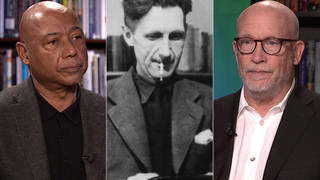
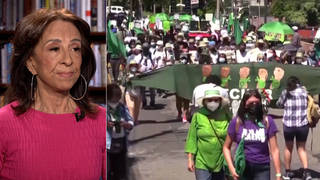






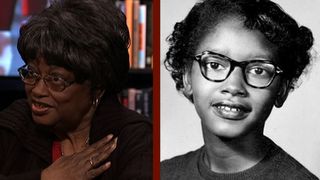
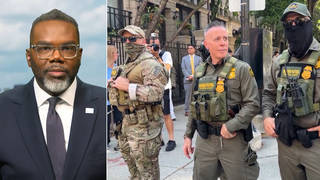
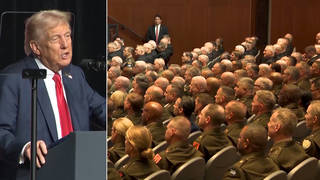
Media Options